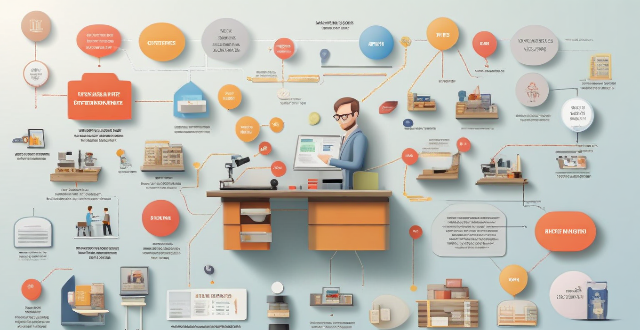Blockchain technology is a powerful tool in the fight against counterfeit products. It ensures product authenticity through digital certificates and smart contracts, enhances traceability by providing a transparent view of the supply chain and end-to-end tracking, improves accountability with data integrity and a complete audit trail, leverages decentralization to prevent manipulation, integrates with IoT devices for automatic verification and real-time monitoring, collaborates with regulatory authorities for compliance and cross-border cooperation, and educates consumers and businesses on its benefits. With blockchain, we can expect significant reductions in counterfeit products in the marketplace.

Preventing Counterfeit Products with Blockchain Technology
Blockchain technology has emerged as a powerful tool in the fight against counterfeit products. By leveraging its decentralized, immutable, and transparent nature, blockchain can help ensure product authenticity, traceability, and accountability throughout the supply chain. In this article, we will explore how blockchain can be used to prevent counterfeit products.
1. Ensuring Product Authenticity
Digital Certificates
One way to prevent counterfeit products is by using digital certificates that are stored on the blockchain. These certificates can contain information about the product's origin, manufacturing date, and other relevant details. By verifying these certificates, consumers can be assured that the product they are purchasing is genuine.
Smart Contracts
Smart contracts can be used to automate the verification process and enforce certain conditions, such as ensuring that a product has been manufactured according to specific standards. This can help prevent counterfeit products from entering the market in the first place.
2. Enhancing Traceability
Supply Chain Transparency
Blockchain can provide a transparent view of the entire supply chain, from raw materials to finished products. This transparency can help identify any irregularities or anomalies that may indicate the presence of counterfeit products.
End-to-End Tracking
By tracking products from their point of origin to their final destination, blockchain can help ensure that each step in the supply chain is accounted for. This can make it more difficult for counterfeiters to introduce fake products into the system.
3. Improving Accountability
Data Integrity
The immutable nature of blockchain ensures that once data is recorded, it cannot be altered or deleted. This makes it easier to hold parties responsible for any instances of counterfeit products within the supply chain.
Audit Trail
A complete audit trail of all transactions related to a product can be maintained on the blockchain. This can help identify any discrepancies or irregularities that may indicate the presence of counterfeit products.
4. Leveraging Decentralization
Distributed Network
The decentralized nature of blockchain means that there is no single point of failure or control. This makes it more difficult for counterfeiters to manipulate the system and introduce fake products into the supply chain.
Consensus Mechanism
Blockchain relies on a consensus mechanism to validate transactions and add new blocks to the chain. This ensures that only valid transactions are recorded, further reducing the likelihood of counterfeit products entering the system.
5. Integrating with IoT Devices
Automatic Verification
IoT devices can be integrated with blockchain to automatically verify the authenticity of products at various stages of the supply chain. This can help reduce human error and increase efficiency in detecting counterfeit products.
Real-Time Monitoring
IoT devices can also provide real-time monitoring of products throughout the supply chain. This can help quickly identify any issues or anomalies that may indicate the presence of counterfeit products.
6. Collaborating with Regulatory Authorities
Regulatory Compliance
Blockchain can facilitate compliance with regulatory requirements by providing a transparent and auditable record of all transactions related to a product. This can help regulatory authorities identify and address instances of counterfeit products more effectively.
Cross-Border Cooperation
Blockchain can enable cross-border cooperation between regulatory authorities by providing a shared platform for information sharing and collaboration. This can help combat the global problem of counterfeit products more effectively.
7. Educating Consumers and Businesses
Consumer Awareness
Educating consumers about the benefits of blockchain technology in preventing counterfeit products can help them make more informed purchasing decisions. This can lead to increased demand for genuine products and reduced sales of counterfeit items.
Business Training
Providing training for businesses on how to implement and use blockchain technology effectively can help them better protect their products from counterfeiters. This can lead to a more secure and trustworthy supply chain overall.
In conclusion, blockchain technology offers numerous opportunities to prevent counterfeit products by ensuring product authenticity, enhancing traceability, improving accountability, leveraging decentralization, integrating with IoT devices, collaborating with regulatory authorities, and educating consumers and businesses. As adoption of this technology continues to grow, we can expect to see significant reductions in the prevalence of counterfeit products in the marketplace.